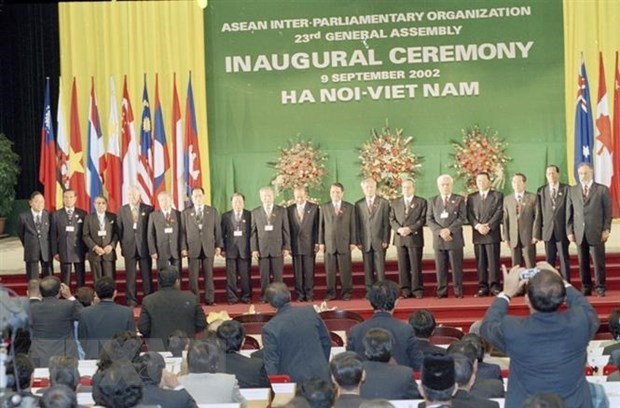 |
|
Vietnamese Party and State leaders pose for a group photo with leaders of AIPO member parliaments at the opening of AIPO-23 in Hanoi on September 9, 2002 (Photo: VNA) |
According to former Vice Chairman of the National Assembly’s Committee for External Relations Ngo Anh Dung, AIPA was initially the ASEAN Inter-Parliamentary Organisation (AIPO), which was formed on September 2, 1977 in Manila, the Philippines, with five members: Indonesia, Malaysia, the Philippines, Singapore, and Thailand.
The establishment of AIPO aimed at promoting collaboration among legislative bodies of regional countries as well as the sharing of information and experience in law-building, thus enhancing mutual understanding, friendship, solidarity, and unity among members.
In 2007, along with the changing of its name as AIPA, the organisation supplemented and adjusted its Charter, completing the organisation of a Jakarta-based Secretariat and strengthening the supervision of the implementation of resolutions through the yearly reporting mechanism.
Commenting on the efficiency of AIPA in fostering cooperation among member parliaments for reaching ASEAN goals, especially over the last decade, Chairman of the NA's Committee for External Relations Nguyen Van Giau said that all activities of the Assembly have been associated with ASEAN’s yearly agenda.
ASEAN Chair Statements, which cover issues from the Political-Security Community, the Economic Community, and the Socio-Cultural Community, have served as the foundation for AIPA’s activities, he said.
He noted that AIPA member parliaments have accompanied ASEAN members’ governments in realising resolutions and declarations approved by ASEAN countries.
Giau stressed the significance of women parliamentarians in AIPA activities, contributing ideals in areas such as politics and socio-economy and ensuring gender equality and the rights of women and children.
Along with ASEAN, AIPA has played a major role in strengthening solidarity and mutual understanding and trust among people in regional countries while positively supporting governments in effectively implementing trans-national cooperation, encouraging the maintenance of national identity, and assisting in improvements to the capacity of member parliaments, he said.
AIPA has also walked shoulder-to-shoulder with regional countries in dealing with major challenges such as the consequences of the global financial crisis, sustainable development, regional security, development gaps, and trans-national crime, Giau said.
Through general assemblies, AIPA has issued a host of resolutions regarding important issues, in particular politics, security, and trust building.
AIPA has helped foster regional integration through the enhancement of cooperation among inter-governmental and inter-parliamentary institutions and the promotion of global peace and international law.
Amid complex developments in the region and world, AIPA has released resolutions calling for stronger engagement from Southeast Asian parliaments in coping with security and political issues in the region. Parliaments have played an important role in ASEAN cooperation for the construction and development of the ASEAN Community, Giau noted.
In the field of economy, AIPA has paid much attention to bolstering cooperation among ASEAN countries and between the grouping and its partners. AIPA has also approved resolutions highlighting the need to narrow the development gap among ASEAN member countries as well as between the bloc and other regions.
AIPA has supported the implementation of the Blueprint of the ASEAN Economic Community (AEC) and suggested that ASEAN make periodical assessments of implementation in line with the AEC Vision 2025.
Regarding the implementation of the UN Sustainable Development Goals (SDGs), AIPA parliamentarians have stressed the need for ASEAN member countries to ensure that economic development is accompanied by the sustainable development of natural resources, minimisation of the negative impact of climate change, food and energy security, and environmental protection and biodiversity.
AIPA has also helped increase regional cooperation in education, culture, and healthcare, while enhancing the role of women in ASEAN, protecting children’s rights, and contributing to resolving issues in the environment, labour, immigration, poverty, and drugs.
AIPA has also contributed to creating consensus among member countries in applying poverty reduction measures, promoting the observation of migrant workers, strengthening discussions on education and vocational training, preventing child labour, fighting drug trafficking and the spread of epidemics and trans-national crime, and cooperating in environmental protection and increasing cooperation in culture and tourism within ASEAN. AIPA has also increased the role of women in all areas and at all levels.
It has supported ASEAN member countries’ governments in building the ASEAN Community on all three pillars: politics-security, economy, and socio-culture.
Giau said that Vietnam's admission to the organisation in 1995 was a historical milestone in the Vietnamese parliament’s relations with its counterparts in regional countries.
Vietnam has actively engaged in AIPA activities since then, including hosting the 23rd and 31st AIPA General Assemblies in 2002 and 2010, respectively, as well as thematic meetings and committee-level meetings, he said./.VNA